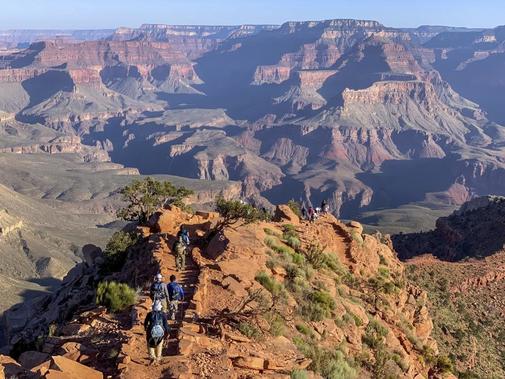- Children's health: Pediatricians 'prescribe' nature and outdoor games to improve health
Forests, parks and natural reserves have a therapeutic effect on the body and mind of people. From the outset, trees act as a natural filter, cleaning the air of pollutants, but there are other additional links between living near green spaces - or spending time in them - and physical and mental well-being. There are many studies that show the benefits of nature in our body, ranging from the stimulation of cognitive ability to protection against stress, through shorter convalescence in case of illness or lower levels of obesity.
However, it is often ignored that these personal benefits also have an economic value for society as a whole, and that conservation efforts and the protection of spaces provide a service, even if it is difficult to quantify. A team of Australian researchers proposes on Tuesday in Nature Communications a method to translate those benefits into figures. "Of course, national parks are valuable not only in economic terms," explains Ralf Buckley, professor of Ecology and Evolution at Griffith University in Australia and first author of the work, "but the truth is that economic value is a political argument. convincing . "
To estimate this value, they use a concept called Quality-adjusted Years of Life (QALY), which measures a person's ability to carry out daily activities without pain or mental disorders . Starting from that base, they collected data from 20,000 inhabitants in the states of Queensland and Victoria, studied the evolution of their AVAC and compared the results of citizens based on the time they spent in the parks. "Governments and insurers use AVAC routinely to decide priorities in health care spending, using real-life examples," says Buckley, "is a way to compare the economic value of different investments and improvements in health, so we have applied that approach to the effects that park visits have on mental health. "
Scientific support
The authors stress that the mental health benefits provided by visits to protected areas have strong scientific support, so that it is possible to assess the costs that would result from their absence, whether they cease to exist or if people could no longer visit them . These costs include treatments, health care and reduction of labor productivity. "If we look at what people have spent on their health, we can calculate what value it gives to certain concrete improvements," says Buckley, "and if we combine and compare all those expenses, we can isolate the average value that these aspects have for each individual. ".
In the specific case of Australia, they estimate that the service value that national parks provide to society amounts to 100,000 million dollars a year (90 million euros). Without the presence of these spaces, researchers believe that the cost invested in mental health across the country would be 7.5% higher. On the other hand, from the national data they have also given an estimate at a global level: they estimate that the national parks are providing an economic value of around 6 billion dollars (5.45 billion euros) annually worldwide, more than the Gross Domestic Product of Japan, the third world power, or more than four times that of Spain.
Although they recognize that the results are based on preliminary calculations and that a more detailed analysis is required to refine those estimates.
In the center of the debate
"The world economy has invested very little in nature conservation because these services have been provided free of charge, despite the high value of ecosystems," the authors denounce in the text. That is why they demand that from now on it be recognized, quantified and included in full right in political debates.
Protected areas have been at the center of global conservation strategies for decades, but throughout the world they are under increasing pressure from political and economic factors, as well as from climate change. This means that, in many countries, natural resources are being sacrificed in favor of industry and commerce. But in their article the authors remember that national parks have an additional value that is not being considered through the mental health of visitors. " Exposure to nature improves people's mental health and well-being; poor mental health imposes great costs on the economy," he said.
According to the criteria of The Trust Project
Know more- Science and Health
- Health
Valencian Community The research center of La Fe bought an apparatus of 4 million through an irregular tender
INTERVIEW "The goal is that there is no relapse in cancer"
CubaA baby dies and four other children are hospitalized in Cuba after receiving a vaccine

